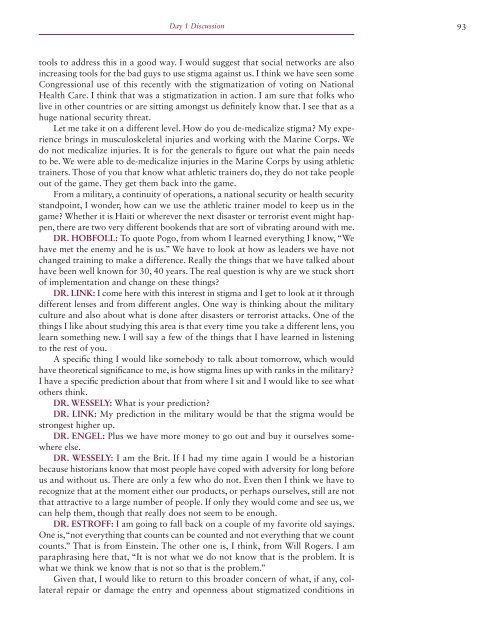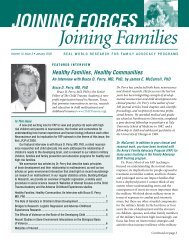stigma and barriers to care - Uniformed Services University of the ...
stigma and barriers to care - Uniformed Services University of the ...
stigma and barriers to care - Uniformed Services University of the ...
Create successful ePaper yourself
Turn your PDF publications into a flip-book with our unique Google optimized e-Paper software.
Day 1 Discussion 93<br />
<strong>to</strong>ols <strong>to</strong> address this in a good way. I would suggest that social networks are also<br />
increasing <strong>to</strong>ols for <strong>the</strong> bad guys <strong>to</strong> use <strong>stigma</strong> against us. I think we have seen some<br />
Congressional use <strong>of</strong> this recently with <strong>the</strong> <strong>stigma</strong>tization <strong>of</strong> voting on National<br />
Health Care. I think that was a <strong>stigma</strong>tization in action. I am sure that folks who<br />
live in o<strong>the</strong>r countries or are sitting amongst us definitely know that. I see that as a<br />
huge national security threat.<br />
Let me take it on a different level. How do you de-medicalize <strong>stigma</strong> My experience<br />
brings in musculoskeletal injuries <strong>and</strong> working with <strong>the</strong> Marine Corps. We<br />
do not medicalize injuries. It is for <strong>the</strong> generals <strong>to</strong> figure out what <strong>the</strong> pain needs<br />
<strong>to</strong> be. We were able <strong>to</strong> de-medicalize injuries in <strong>the</strong> Marine Corps by using athletic<br />
trainers. Those <strong>of</strong> you that know what athletic trainers do, <strong>the</strong>y do not take people<br />
out <strong>of</strong> <strong>the</strong> game. They get <strong>the</strong>m back in<strong>to</strong> <strong>the</strong> game.<br />
From a military, a continuity <strong>of</strong> operations, a national security or health security<br />
st<strong>and</strong>point, I wonder, how can we use <strong>the</strong> athletic trainer model <strong>to</strong> keep us in <strong>the</strong><br />
game Whe<strong>the</strong>r it is Haiti or wherever <strong>the</strong> next disaster or terrorist event might happen,<br />
<strong>the</strong>re are two very different bookends that are sort <strong>of</strong> vibrating around with me.<br />
DR. HOBFOLL: To quote Pogo, from whom I learned everything I know, “We<br />
have met <strong>the</strong> enemy <strong>and</strong> he is us.” We have <strong>to</strong> look at how as leaders we have not<br />
changed training <strong>to</strong> make a difference. Really <strong>the</strong> things that we have talked about<br />
have been well known for 30, 40 years. The real question is why are we stuck short<br />
<strong>of</strong> implementation <strong>and</strong> change on <strong>the</strong>se things<br />
DR. LINK: I come here with this interest in <strong>stigma</strong> <strong>and</strong> I get <strong>to</strong> look at it through<br />
different lenses <strong>and</strong> from different angles. One way is thinking about <strong>the</strong> military<br />
culture <strong>and</strong> also about what is done after disasters or terrorist attacks. One <strong>of</strong> <strong>the</strong><br />
things I like about studying this area is that every time you take a different lens, you<br />
learn something new. I will say a few <strong>of</strong> <strong>the</strong> things that I have learned in listening<br />
<strong>to</strong> <strong>the</strong> rest <strong>of</strong> you.<br />
A specific thing I would like somebody <strong>to</strong> talk about <strong>to</strong>morrow, which would<br />
have <strong>the</strong>oretical significance <strong>to</strong> me, is how <strong>stigma</strong> lines up with ranks in <strong>the</strong> military<br />
I have a specific prediction about that from where I sit <strong>and</strong> I would like <strong>to</strong> see what<br />
o<strong>the</strong>rs think.<br />
DR. WESSELY: What is your prediction<br />
DR. LINK: My prediction in <strong>the</strong> military would be that <strong>the</strong> <strong>stigma</strong> would be<br />
strongest higher up.<br />
DR. ENGEL: Plus we have more money <strong>to</strong> go out <strong>and</strong> buy it ourselves somewhere<br />
else.<br />
DR. WESSELY: I am <strong>the</strong> Brit. If I had my time again I would be a his<strong>to</strong>rian<br />
because his<strong>to</strong>rians know that most people have coped with adversity for long before<br />
us <strong>and</strong> without us. There are only a few who do not. Even <strong>the</strong>n I think we have <strong>to</strong><br />
recognize that at <strong>the</strong> moment ei<strong>the</strong>r our products, or perhaps ourselves, still are not<br />
that attractive <strong>to</strong> a large number <strong>of</strong> people. If only <strong>the</strong>y would come <strong>and</strong> see us, we<br />
can help <strong>the</strong>m, though that really does not seem <strong>to</strong> be enough.<br />
DR. ESTROFF: I am going <strong>to</strong> fall back on a couple <strong>of</strong> my favorite old sayings.<br />
One is,“not everything that counts can be counted <strong>and</strong> not everything that we count<br />
counts.” That is from Einstein. The o<strong>the</strong>r one is, I think, from Will Rogers. I am<br />
paraphrasing here that, “It is not what we do not know that is <strong>the</strong> problem. It is<br />
what we think we know that is not so that is <strong>the</strong> problem.”<br />
Given that, I would like <strong>to</strong> return <strong>to</strong> this broader concern <strong>of</strong> what, if any, collateral<br />
repair or damage <strong>the</strong> entry <strong>and</strong> openness about <strong>stigma</strong>tized conditions in




